Annotated Bibliography: Diet's Impact on Cardiovascular Diseases
VerifiedAdded on 2023/03/17
|8
|1870
|51
Annotated Bibliography
AI Summary
This annotated bibliography examines the relationship between diet and cardiovascular diseases, synthesizing research from multiple studies. It explores the impact of omega-3 fatty acids, fruit and vegetable intake, nut consumption, whole grain consumption, and green tea consumption on cardiovascular health. The bibliography includes summaries of key studies, highlighting methodologies such as randomized controlled trials and meta-analyses, and discusses the limitations of each study. The research indicates that dietary interventions, including increased intake of omega-3s, fruits, vegetables, nuts, and whole grains, and potentially green tea, are associated with reduced risks of cardiovascular diseases. The author uses the research to investigate how diet can reduce the prevalence of cardiovascular diseases, and highlights the importance of considering limitations like potential biases in meta-analyses and the need for further research on specific dietary components.
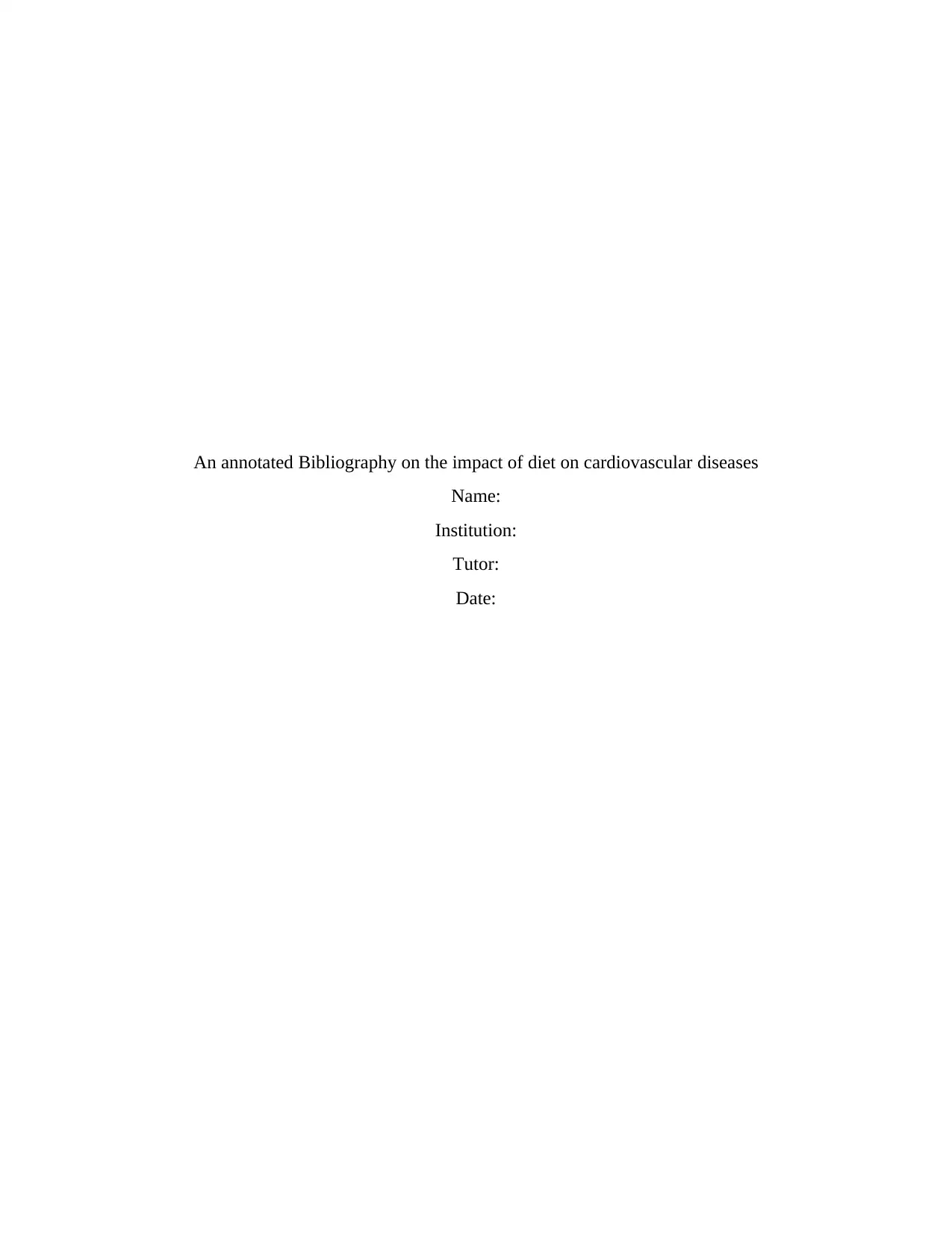
An annotated Bibliography on the impact of diet on cardiovascular diseases
Name:
Institution:
Tutor:
Date:
Name:
Institution:
Tutor:
Date:
Paraphrase This Document
Need a fresh take? Get an instant paraphrase of this document with our AI Paraphraser
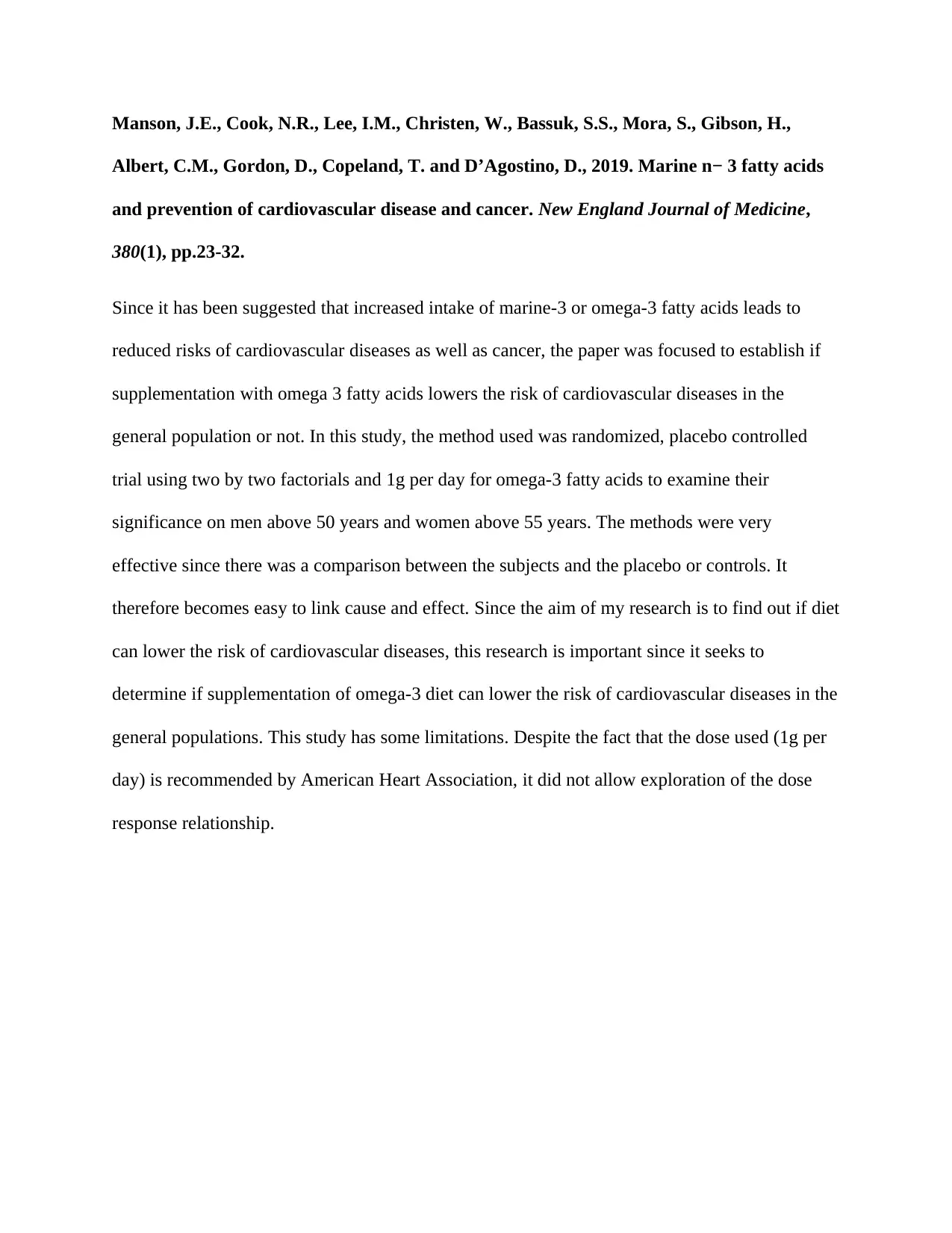
Manson, J.E., Cook, N.R., Lee, I.M., Christen, W., Bassuk, S.S., Mora, S., Gibson, H.,
Albert, C.M., Gordon, D., Copeland, T. and D’Agostino, D., 2019. Marine n− 3 fatty acids
and prevention of cardiovascular disease and cancer. New England Journal of Medicine,
380(1), pp.23-32.
Since it has been suggested that increased intake of marine-3 or omega-3 fatty acids leads to
reduced risks of cardiovascular diseases as well as cancer, the paper was focused to establish if
supplementation with omega 3 fatty acids lowers the risk of cardiovascular diseases in the
general population or not. In this study, the method used was randomized, placebo controlled
trial using two by two factorials and 1g per day for omega-3 fatty acids to examine their
significance on men above 50 years and women above 55 years. The methods were very
effective since there was a comparison between the subjects and the placebo or controls. It
therefore becomes easy to link cause and effect. Since the aim of my research is to find out if diet
can lower the risk of cardiovascular diseases, this research is important since it seeks to
determine if supplementation of omega-3 diet can lower the risk of cardiovascular diseases in the
general populations. This study has some limitations. Despite the fact that the dose used (1g per
day) is recommended by American Heart Association, it did not allow exploration of the dose
response relationship.
Albert, C.M., Gordon, D., Copeland, T. and D’Agostino, D., 2019. Marine n− 3 fatty acids
and prevention of cardiovascular disease and cancer. New England Journal of Medicine,
380(1), pp.23-32.
Since it has been suggested that increased intake of marine-3 or omega-3 fatty acids leads to
reduced risks of cardiovascular diseases as well as cancer, the paper was focused to establish if
supplementation with omega 3 fatty acids lowers the risk of cardiovascular diseases in the
general population or not. In this study, the method used was randomized, placebo controlled
trial using two by two factorials and 1g per day for omega-3 fatty acids to examine their
significance on men above 50 years and women above 55 years. The methods were very
effective since there was a comparison between the subjects and the placebo or controls. It
therefore becomes easy to link cause and effect. Since the aim of my research is to find out if diet
can lower the risk of cardiovascular diseases, this research is important since it seeks to
determine if supplementation of omega-3 diet can lower the risk of cardiovascular diseases in the
general populations. This study has some limitations. Despite the fact that the dose used (1g per
day) is recommended by American Heart Association, it did not allow exploration of the dose
response relationship.
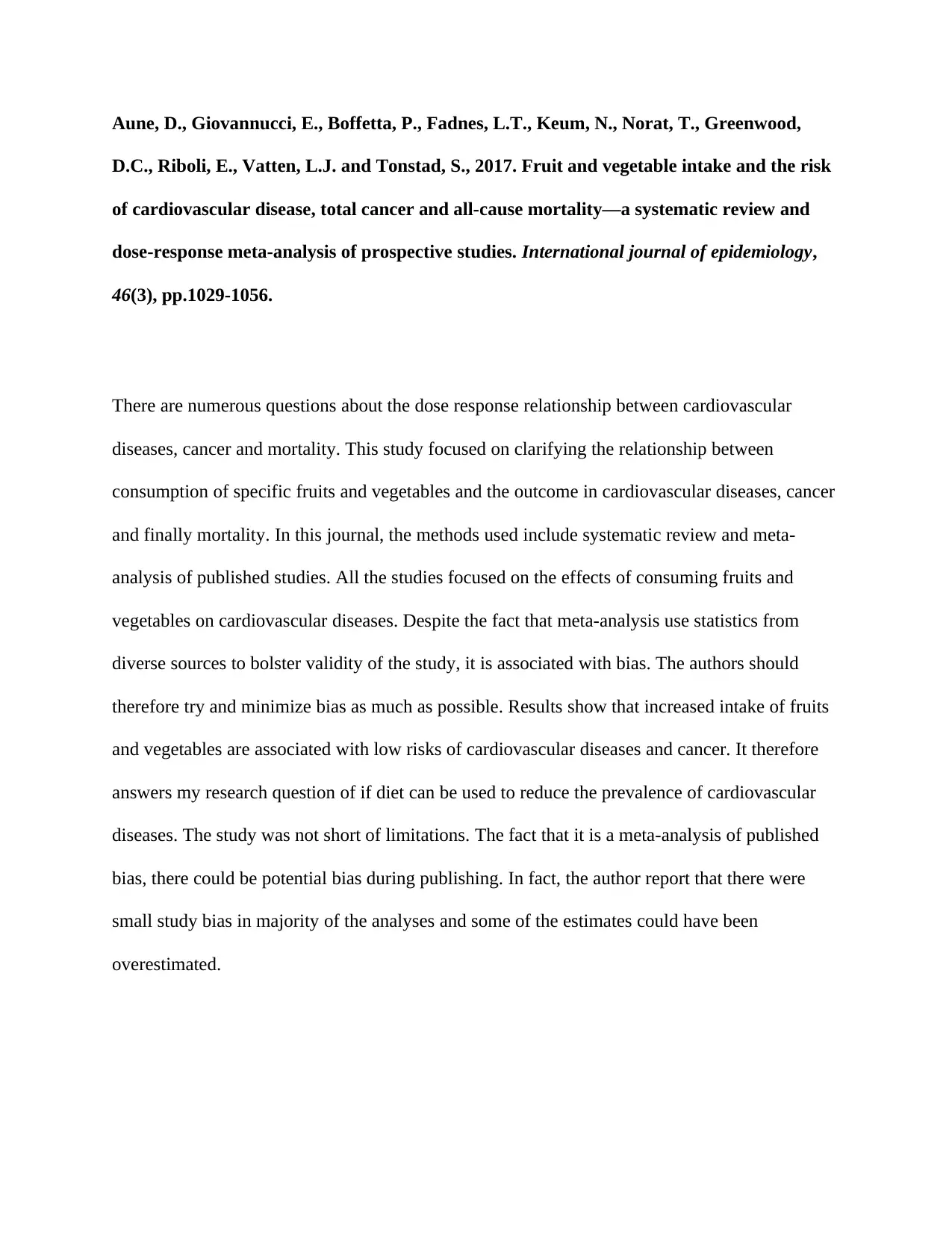
Aune, D., Giovannucci, E., Boffetta, P., Fadnes, L.T., Keum, N., Norat, T., Greenwood,
D.C., Riboli, E., Vatten, L.J. and Tonstad, S., 2017. Fruit and vegetable intake and the risk
of cardiovascular disease, total cancer and all-cause mortality—a systematic review and
dose-response meta-analysis of prospective studies. International journal of epidemiology,
46(3), pp.1029-1056.
There are numerous questions about the dose response relationship between cardiovascular
diseases, cancer and mortality. This study focused on clarifying the relationship between
consumption of specific fruits and vegetables and the outcome in cardiovascular diseases, cancer
and finally mortality. In this journal, the methods used include systematic review and meta-
analysis of published studies. All the studies focused on the effects of consuming fruits and
vegetables on cardiovascular diseases. Despite the fact that meta-analysis use statistics from
diverse sources to bolster validity of the study, it is associated with bias. The authors should
therefore try and minimize bias as much as possible. Results show that increased intake of fruits
and vegetables are associated with low risks of cardiovascular diseases and cancer. It therefore
answers my research question of if diet can be used to reduce the prevalence of cardiovascular
diseases. The study was not short of limitations. The fact that it is a meta-analysis of published
bias, there could be potential bias during publishing. In fact, the author report that there were
small study bias in majority of the analyses and some of the estimates could have been
overestimated.
D.C., Riboli, E., Vatten, L.J. and Tonstad, S., 2017. Fruit and vegetable intake and the risk
of cardiovascular disease, total cancer and all-cause mortality—a systematic review and
dose-response meta-analysis of prospective studies. International journal of epidemiology,
46(3), pp.1029-1056.
There are numerous questions about the dose response relationship between cardiovascular
diseases, cancer and mortality. This study focused on clarifying the relationship between
consumption of specific fruits and vegetables and the outcome in cardiovascular diseases, cancer
and finally mortality. In this journal, the methods used include systematic review and meta-
analysis of published studies. All the studies focused on the effects of consuming fruits and
vegetables on cardiovascular diseases. Despite the fact that meta-analysis use statistics from
diverse sources to bolster validity of the study, it is associated with bias. The authors should
therefore try and minimize bias as much as possible. Results show that increased intake of fruits
and vegetables are associated with low risks of cardiovascular diseases and cancer. It therefore
answers my research question of if diet can be used to reduce the prevalence of cardiovascular
diseases. The study was not short of limitations. The fact that it is a meta-analysis of published
bias, there could be potential bias during publishing. In fact, the author report that there were
small study bias in majority of the analyses and some of the estimates could have been
overestimated.
⊘ This is a preview!⊘
Do you want full access?
Subscribe today to unlock all pages.

Trusted by 1+ million students worldwide
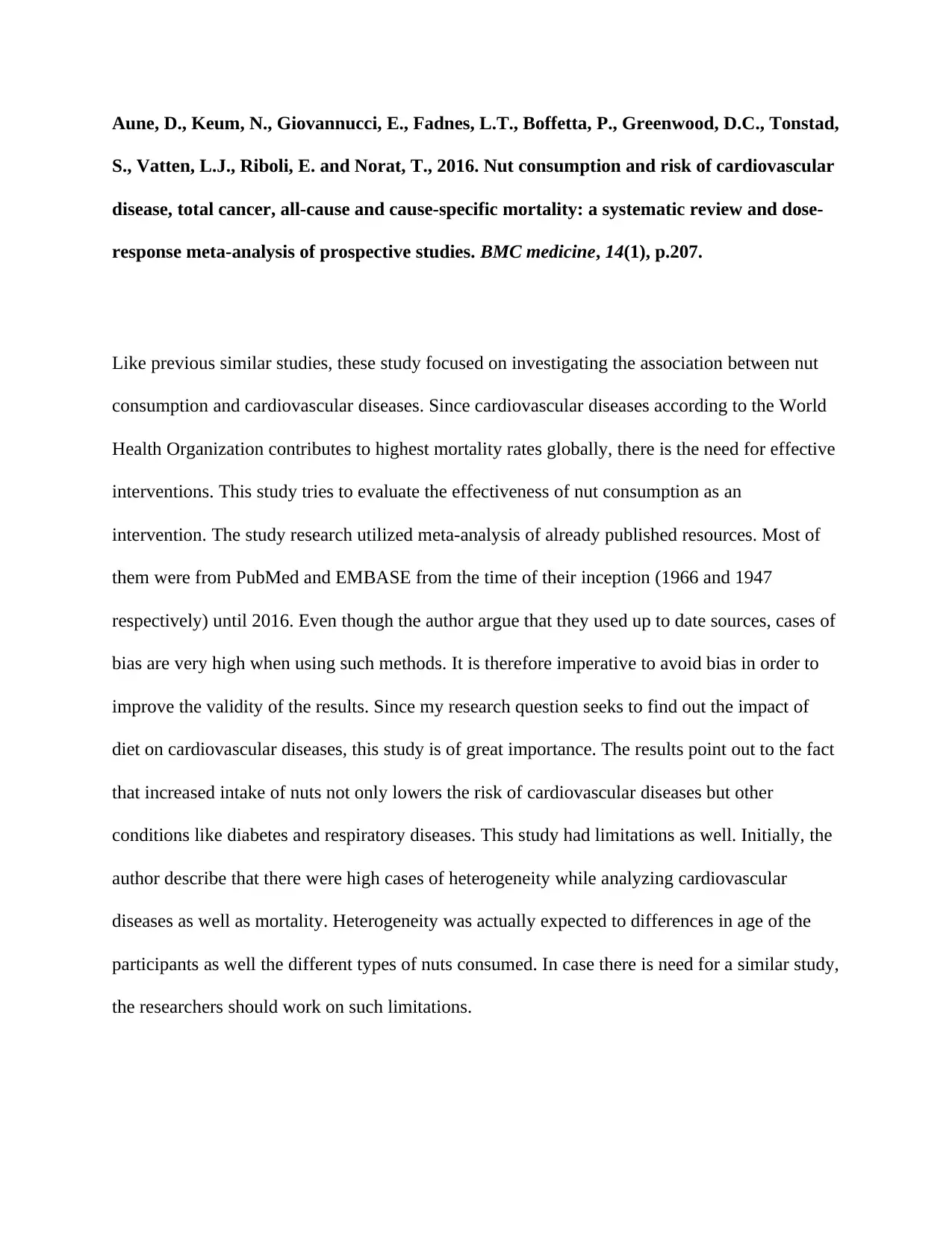
Aune, D., Keum, N., Giovannucci, E., Fadnes, L.T., Boffetta, P., Greenwood, D.C., Tonstad,
S., Vatten, L.J., Riboli, E. and Norat, T., 2016. Nut consumption and risk of cardiovascular
disease, total cancer, all-cause and cause-specific mortality: a systematic review and dose-
response meta-analysis of prospective studies. BMC medicine, 14(1), p.207.
Like previous similar studies, these study focused on investigating the association between nut
consumption and cardiovascular diseases. Since cardiovascular diseases according to the World
Health Organization contributes to highest mortality rates globally, there is the need for effective
interventions. This study tries to evaluate the effectiveness of nut consumption as an
intervention. The study research utilized meta-analysis of already published resources. Most of
them were from PubMed and EMBASE from the time of their inception (1966 and 1947
respectively) until 2016. Even though the author argue that they used up to date sources, cases of
bias are very high when using such methods. It is therefore imperative to avoid bias in order to
improve the validity of the results. Since my research question seeks to find out the impact of
diet on cardiovascular diseases, this study is of great importance. The results point out to the fact
that increased intake of nuts not only lowers the risk of cardiovascular diseases but other
conditions like diabetes and respiratory diseases. This study had limitations as well. Initially, the
author describe that there were high cases of heterogeneity while analyzing cardiovascular
diseases as well as mortality. Heterogeneity was actually expected to differences in age of the
participants as well the different types of nuts consumed. In case there is need for a similar study,
the researchers should work on such limitations.
S., Vatten, L.J., Riboli, E. and Norat, T., 2016. Nut consumption and risk of cardiovascular
disease, total cancer, all-cause and cause-specific mortality: a systematic review and dose-
response meta-analysis of prospective studies. BMC medicine, 14(1), p.207.
Like previous similar studies, these study focused on investigating the association between nut
consumption and cardiovascular diseases. Since cardiovascular diseases according to the World
Health Organization contributes to highest mortality rates globally, there is the need for effective
interventions. This study tries to evaluate the effectiveness of nut consumption as an
intervention. The study research utilized meta-analysis of already published resources. Most of
them were from PubMed and EMBASE from the time of their inception (1966 and 1947
respectively) until 2016. Even though the author argue that they used up to date sources, cases of
bias are very high when using such methods. It is therefore imperative to avoid bias in order to
improve the validity of the results. Since my research question seeks to find out the impact of
diet on cardiovascular diseases, this study is of great importance. The results point out to the fact
that increased intake of nuts not only lowers the risk of cardiovascular diseases but other
conditions like diabetes and respiratory diseases. This study had limitations as well. Initially, the
author describe that there were high cases of heterogeneity while analyzing cardiovascular
diseases as well as mortality. Heterogeneity was actually expected to differences in age of the
participants as well the different types of nuts consumed. In case there is need for a similar study,
the researchers should work on such limitations.
Paraphrase This Document
Need a fresh take? Get an instant paraphrase of this document with our AI Paraphraser
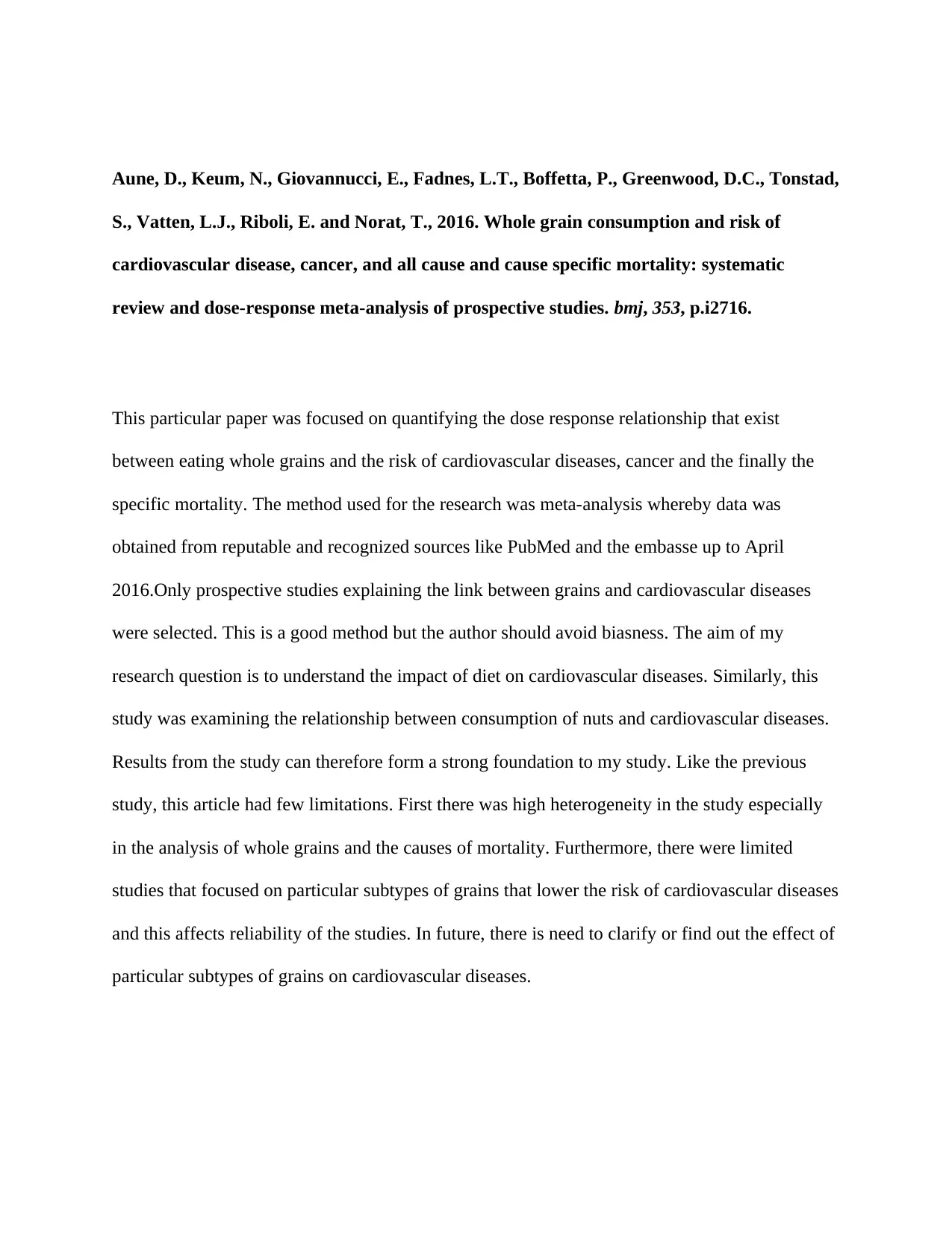
Aune, D., Keum, N., Giovannucci, E., Fadnes, L.T., Boffetta, P., Greenwood, D.C., Tonstad,
S., Vatten, L.J., Riboli, E. and Norat, T., 2016. Whole grain consumption and risk of
cardiovascular disease, cancer, and all cause and cause specific mortality: systematic
review and dose-response meta-analysis of prospective studies. bmj, 353, p.i2716.
This particular paper was focused on quantifying the dose response relationship that exist
between eating whole grains and the risk of cardiovascular diseases, cancer and the finally the
specific mortality. The method used for the research was meta-analysis whereby data was
obtained from reputable and recognized sources like PubMed and the embasse up to April
2016.Only prospective studies explaining the link between grains and cardiovascular diseases
were selected. This is a good method but the author should avoid biasness. The aim of my
research question is to understand the impact of diet on cardiovascular diseases. Similarly, this
study was examining the relationship between consumption of nuts and cardiovascular diseases.
Results from the study can therefore form a strong foundation to my study. Like the previous
study, this article had few limitations. First there was high heterogeneity in the study especially
in the analysis of whole grains and the causes of mortality. Furthermore, there were limited
studies that focused on particular subtypes of grains that lower the risk of cardiovascular diseases
and this affects reliability of the studies. In future, there is need to clarify or find out the effect of
particular subtypes of grains on cardiovascular diseases.
S., Vatten, L.J., Riboli, E. and Norat, T., 2016. Whole grain consumption and risk of
cardiovascular disease, cancer, and all cause and cause specific mortality: systematic
review and dose-response meta-analysis of prospective studies. bmj, 353, p.i2716.
This particular paper was focused on quantifying the dose response relationship that exist
between eating whole grains and the risk of cardiovascular diseases, cancer and the finally the
specific mortality. The method used for the research was meta-analysis whereby data was
obtained from reputable and recognized sources like PubMed and the embasse up to April
2016.Only prospective studies explaining the link between grains and cardiovascular diseases
were selected. This is a good method but the author should avoid biasness. The aim of my
research question is to understand the impact of diet on cardiovascular diseases. Similarly, this
study was examining the relationship between consumption of nuts and cardiovascular diseases.
Results from the study can therefore form a strong foundation to my study. Like the previous
study, this article had few limitations. First there was high heterogeneity in the study especially
in the analysis of whole grains and the causes of mortality. Furthermore, there were limited
studies that focused on particular subtypes of grains that lower the risk of cardiovascular diseases
and this affects reliability of the studies. In future, there is need to clarify or find out the effect of
particular subtypes of grains on cardiovascular diseases.
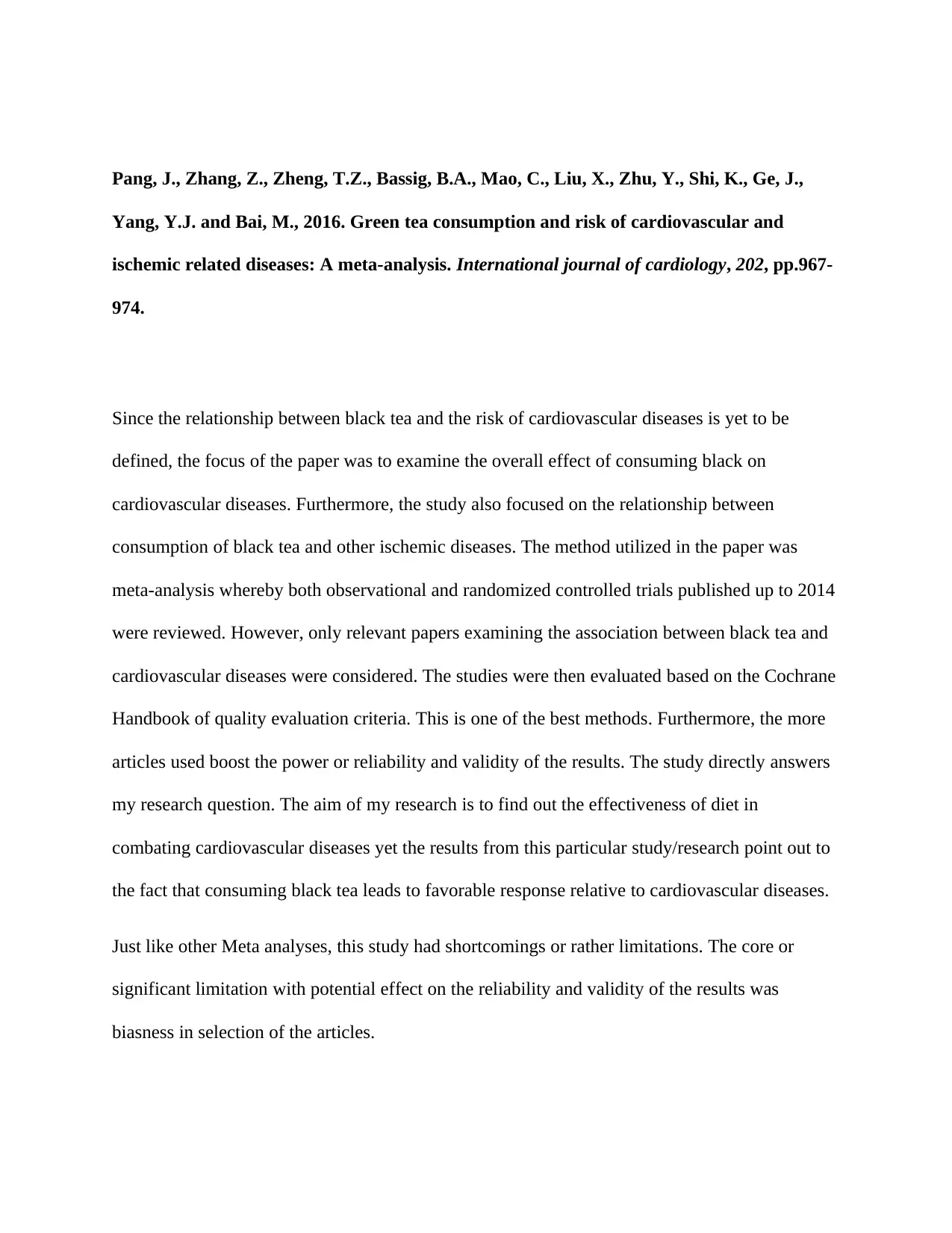
Pang, J., Zhang, Z., Zheng, T.Z., Bassig, B.A., Mao, C., Liu, X., Zhu, Y., Shi, K., Ge, J.,
Yang, Y.J. and Bai, M., 2016. Green tea consumption and risk of cardiovascular and
ischemic related diseases: A meta-analysis. International journal of cardiology, 202, pp.967-
974.
Since the relationship between black tea and the risk of cardiovascular diseases is yet to be
defined, the focus of the paper was to examine the overall effect of consuming black on
cardiovascular diseases. Furthermore, the study also focused on the relationship between
consumption of black tea and other ischemic diseases. The method utilized in the paper was
meta-analysis whereby both observational and randomized controlled trials published up to 2014
were reviewed. However, only relevant papers examining the association between black tea and
cardiovascular diseases were considered. The studies were then evaluated based on the Cochrane
Handbook of quality evaluation criteria. This is one of the best methods. Furthermore, the more
articles used boost the power or reliability and validity of the results. The study directly answers
my research question. The aim of my research is to find out the effectiveness of diet in
combating cardiovascular diseases yet the results from this particular study/research point out to
the fact that consuming black tea leads to favorable response relative to cardiovascular diseases.
Just like other Meta analyses, this study had shortcomings or rather limitations. The core or
significant limitation with potential effect on the reliability and validity of the results was
biasness in selection of the articles.
Yang, Y.J. and Bai, M., 2016. Green tea consumption and risk of cardiovascular and
ischemic related diseases: A meta-analysis. International journal of cardiology, 202, pp.967-
974.
Since the relationship between black tea and the risk of cardiovascular diseases is yet to be
defined, the focus of the paper was to examine the overall effect of consuming black on
cardiovascular diseases. Furthermore, the study also focused on the relationship between
consumption of black tea and other ischemic diseases. The method utilized in the paper was
meta-analysis whereby both observational and randomized controlled trials published up to 2014
were reviewed. However, only relevant papers examining the association between black tea and
cardiovascular diseases were considered. The studies were then evaluated based on the Cochrane
Handbook of quality evaluation criteria. This is one of the best methods. Furthermore, the more
articles used boost the power or reliability and validity of the results. The study directly answers
my research question. The aim of my research is to find out the effectiveness of diet in
combating cardiovascular diseases yet the results from this particular study/research point out to
the fact that consuming black tea leads to favorable response relative to cardiovascular diseases.
Just like other Meta analyses, this study had shortcomings or rather limitations. The core or
significant limitation with potential effect on the reliability and validity of the results was
biasness in selection of the articles.
⊘ This is a preview!⊘
Do you want full access?
Subscribe today to unlock all pages.

Trusted by 1+ million students worldwide
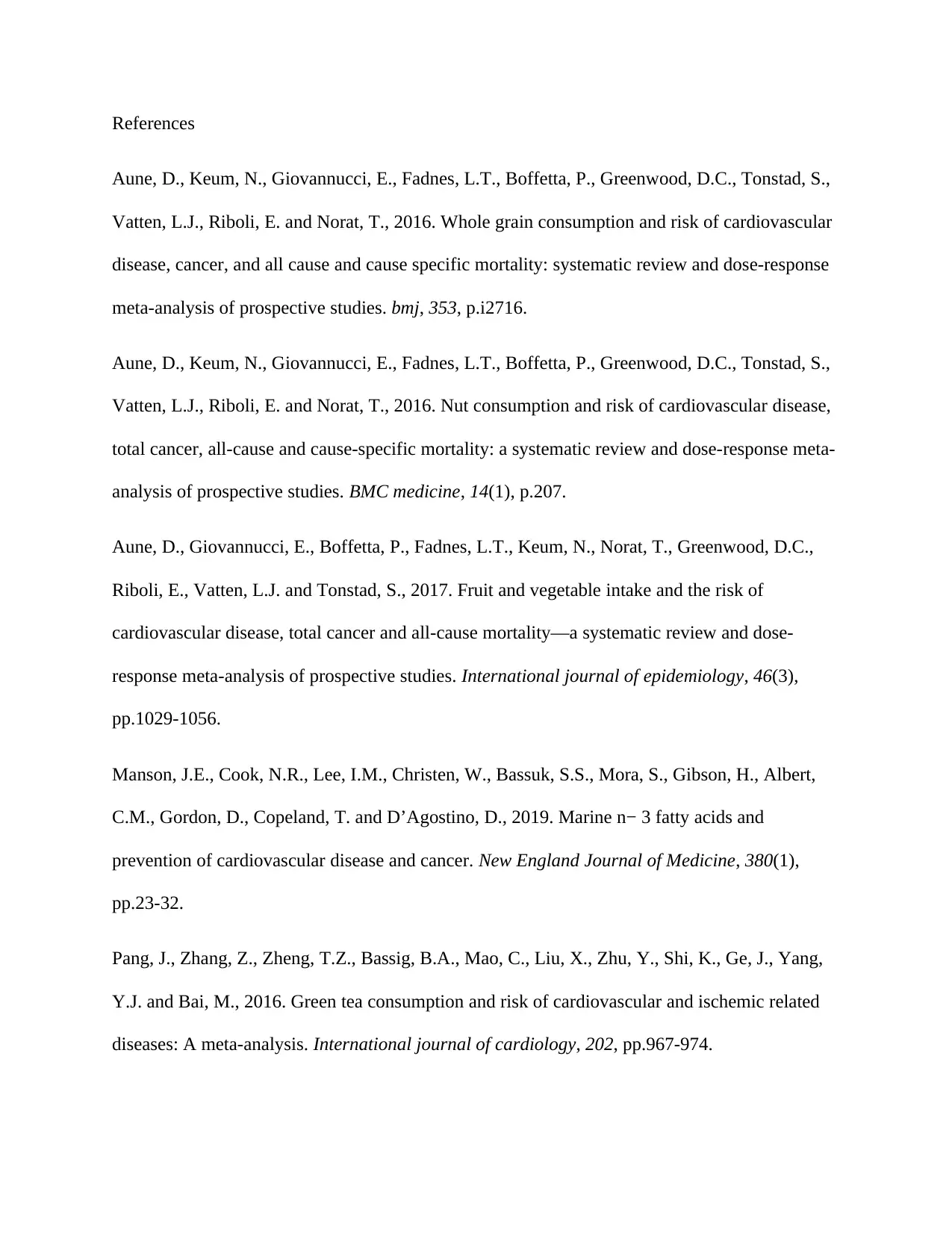
References
Aune, D., Keum, N., Giovannucci, E., Fadnes, L.T., Boffetta, P., Greenwood, D.C., Tonstad, S.,
Vatten, L.J., Riboli, E. and Norat, T., 2016. Whole grain consumption and risk of cardiovascular
disease, cancer, and all cause and cause specific mortality: systematic review and dose-response
meta-analysis of prospective studies. bmj, 353, p.i2716.
Aune, D., Keum, N., Giovannucci, E., Fadnes, L.T., Boffetta, P., Greenwood, D.C., Tonstad, S.,
Vatten, L.J., Riboli, E. and Norat, T., 2016. Nut consumption and risk of cardiovascular disease,
total cancer, all-cause and cause-specific mortality: a systematic review and dose-response meta-
analysis of prospective studies. BMC medicine, 14(1), p.207.
Aune, D., Giovannucci, E., Boffetta, P., Fadnes, L.T., Keum, N., Norat, T., Greenwood, D.C.,
Riboli, E., Vatten, L.J. and Tonstad, S., 2017. Fruit and vegetable intake and the risk of
cardiovascular disease, total cancer and all-cause mortality—a systematic review and dose-
response meta-analysis of prospective studies. International journal of epidemiology, 46(3),
pp.1029-1056.
Manson, J.E., Cook, N.R., Lee, I.M., Christen, W., Bassuk, S.S., Mora, S., Gibson, H., Albert,
C.M., Gordon, D., Copeland, T. and D’Agostino, D., 2019. Marine n− 3 fatty acids and
prevention of cardiovascular disease and cancer. New England Journal of Medicine, 380(1),
pp.23-32.
Pang, J., Zhang, Z., Zheng, T.Z., Bassig, B.A., Mao, C., Liu, X., Zhu, Y., Shi, K., Ge, J., Yang,
Y.J. and Bai, M., 2016. Green tea consumption and risk of cardiovascular and ischemic related
diseases: A meta-analysis. International journal of cardiology, 202, pp.967-974.
Aune, D., Keum, N., Giovannucci, E., Fadnes, L.T., Boffetta, P., Greenwood, D.C., Tonstad, S.,
Vatten, L.J., Riboli, E. and Norat, T., 2016. Whole grain consumption and risk of cardiovascular
disease, cancer, and all cause and cause specific mortality: systematic review and dose-response
meta-analysis of prospective studies. bmj, 353, p.i2716.
Aune, D., Keum, N., Giovannucci, E., Fadnes, L.T., Boffetta, P., Greenwood, D.C., Tonstad, S.,
Vatten, L.J., Riboli, E. and Norat, T., 2016. Nut consumption and risk of cardiovascular disease,
total cancer, all-cause and cause-specific mortality: a systematic review and dose-response meta-
analysis of prospective studies. BMC medicine, 14(1), p.207.
Aune, D., Giovannucci, E., Boffetta, P., Fadnes, L.T., Keum, N., Norat, T., Greenwood, D.C.,
Riboli, E., Vatten, L.J. and Tonstad, S., 2017. Fruit and vegetable intake and the risk of
cardiovascular disease, total cancer and all-cause mortality—a systematic review and dose-
response meta-analysis of prospective studies. International journal of epidemiology, 46(3),
pp.1029-1056.
Manson, J.E., Cook, N.R., Lee, I.M., Christen, W., Bassuk, S.S., Mora, S., Gibson, H., Albert,
C.M., Gordon, D., Copeland, T. and D’Agostino, D., 2019. Marine n− 3 fatty acids and
prevention of cardiovascular disease and cancer. New England Journal of Medicine, 380(1),
pp.23-32.
Pang, J., Zhang, Z., Zheng, T.Z., Bassig, B.A., Mao, C., Liu, X., Zhu, Y., Shi, K., Ge, J., Yang,
Y.J. and Bai, M., 2016. Green tea consumption and risk of cardiovascular and ischemic related
diseases: A meta-analysis. International journal of cardiology, 202, pp.967-974.
Paraphrase This Document
Need a fresh take? Get an instant paraphrase of this document with our AI Paraphraser

1 out of 8
Your All-in-One AI-Powered Toolkit for Academic Success.
+13062052269
info@desklib.com
Available 24*7 on WhatsApp / Email
![[object Object]](/_next/static/media/star-bottom.7253800d.svg)
Unlock your academic potential
Copyright © 2020–2026 A2Z Services. All Rights Reserved. Developed and managed by ZUCOL.